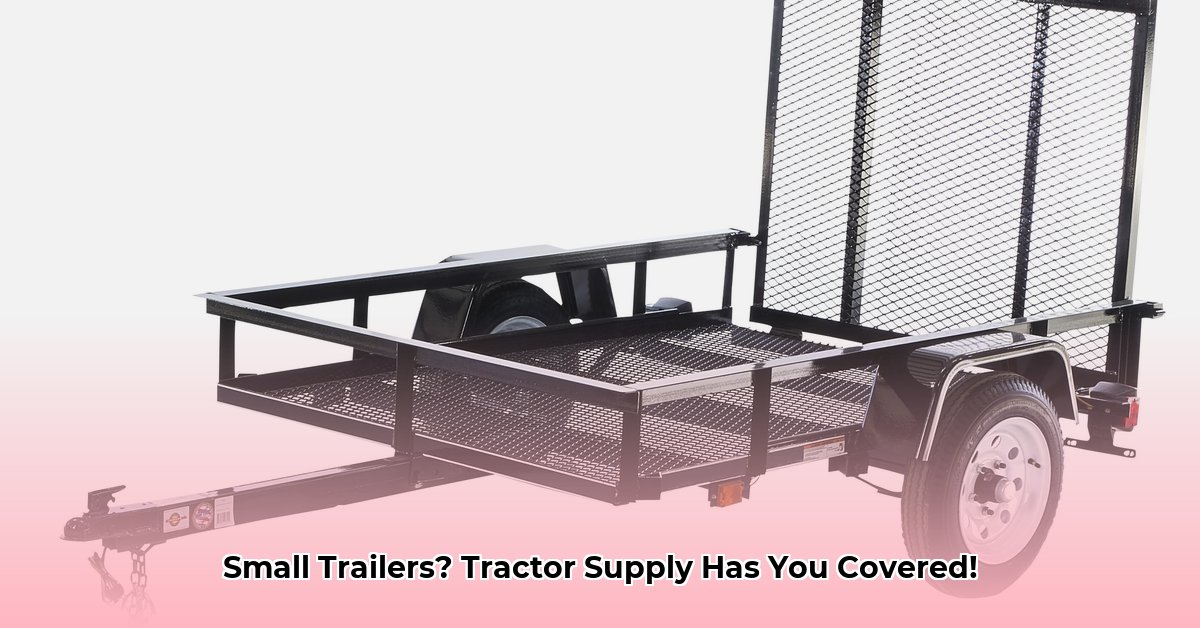
Finding the right small trailer can be a challenge. Too small, and it won't handle the job; too big, and it's cumbersome. This guide helps you navigate the options at Tractor Supply (TSC) and beyond, ensuring you get the best trailer for your needs and budget. We'll compare TSC's offerings to competitors, provide a step-by-step selection process, and offer essential maintenance tips. For heavier loads, consider a lawn roller.
Small Trailers: Types and Uses
Tractor Supply offers various small trailers, each designed for specific tasks. Understanding these differences is crucial for making the right choice.
Utility Trailers: The workhorses of the trailer world. Ideal for hauling building materials, landscaping supplies, and general cargo. Their versatility makes them a popular choice.
Enclosed Trailers: Perfect for protecting sensitive equipment, tools, or cargo from the elements. They offer superior security compared to open utility trailers.
Livestock Trailers: Designed for safe and comfortable animal transport. Features like proper ventilation and secure sides are key considerations.
Dump Trailers: Efficiently move loose materials like dirt, gravel, or mulch. The dumping mechanism significantly speeds up unloading.
Boat Trailers: Specifically designed to securely transport boats of various sizes. Proper weight distribution and support are critical.
Choosing the right type depends on your primary hauling needs. Consider weight capacity, dimensions, and additional features before making a decision. What are your biggest hauling challenges, and what type of trailer best addresses those challenges?
Tractor Supply vs. the Competition: A Comparative Analysis
To find the best value, comparing TSC's trailers to those from competitors like Lowe's and Ace Hardware is crucial. This table provides a sample comparison; actual models, features, and prices may vary by location and availability.
| Feature | Tractor Supply Utility Trailer (Example) | Lowe's Utility Trailer (Comparable) | Ace Hardware Utility Trailer (Comparable) | Pros/Cons |
|---|---|---|---|---|
| Price | ~$700 | ~$850 | ~$650 | TSC: Often budget-friendly; Lowe's & Ace: May offer higher-end features |
| Weight Capacity | 1500 lbs | 1750 lbs | 1200 lbs | Consider your heaviest load. Overloading is dangerous and illegal. |
| Material | Steel | Steel | Aluminum | Steel: Durable but heavier; Aluminum: Lighter weight, potentially less durable |
| Features | Safety chains, stake pockets | LED lights, ramp | Folding sides, tie-down rings | Prioritize features essential for your needs (e.g., lighting, ramps) |
Note: Prices are estimates. Always verify current pricing with the respective retailers.
Choosing the Right Trailer: A Step-by-Step Guide
Selecting the perfect trailer involves careful planning. Follow these steps for optimal results:
Assess Your Needs: What will you mainly haul? Consider size, weight, and the types of surfaces you'll be driving on.
Determine Weight Capacity: Calculate the heaviest load you anticipate. Choose a trailer with a significantly higher weight capacity to ensure safety and prevent overloading.
Check Towing Capacity: Consult your vehicle's owner's manual to determine its maximum towing capacity. The combined weight of the trailer and its contents must be within this limit.
Size it Right: Measure your largest potential loads to estimate the required trailer dimensions. Aim for a size that's sufficient without being unnecessarily large.
Compare Models: Carefully compare specifications, features, warranties, and prices from TSC and competitors. Don't solely focus on the initial purchase price.
Read Reviews: Review online testimonials from other buyers to gain valuable insights into real-world performance and potential issues.
Following these steps increases your chances of selecting a trailer that meets your specific needs and budget. Have you considered all elements of your hauling needs before choosing a trailer?
Maintenance and Safety: Essential Practices
Regular maintenance extends the life of your trailer and ensures safe operation. These are vital practices:
Tire Inspection: Regularly check tire pressure and inspect for wear and tear. Replace worn tires promptly.
Lubrication: Lubricate moving parts (bearings, etc.) regularly to prevent wear and ensure smooth operation. A well-lubricated trailer is a safe and efficient trailer.
Light Check: Before each use, verify that all lights are functioning correctly. Faulty lights are a safety hazard.
Secure Loads: Always properly secure your cargo to prevent shifting during transport. Use ropes, straps, or other appropriate methods.
Adhere to Traffic Laws: Obey all traffic regulations when towing a trailer, including speed limits and lane restrictions.
By following these maintenance tips and safety guidelines, you can help ensure long-term trailer longevity and safe operation.
Conclusion
Selecting the right small trailer is a critical decision. This guide empowers you to make an informed choice by comparing options, understanding features, and prioritizing safety. Remember to check prices at Tractor Supply and competitor stores, inspect any trailer before purchase, and maintain your trailer regularly. Happy hauling!